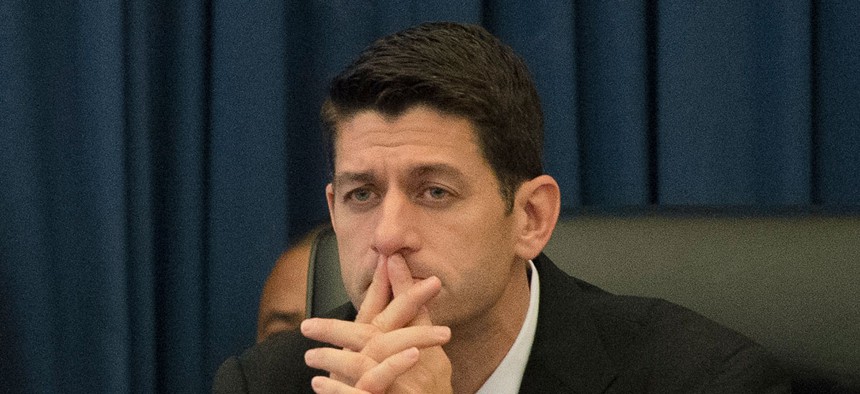
Mass Communication Specialist 1st Class Daniel Hinton/Navy file photo
Apparent Collapse of Obamacare Repeal Makes It Harder to Pass a Budget
Congressional Obamacare repeal woes make it trickier to write a spending blueprint and a tax-reform package.
The GOP flameout on its Obamacare-repeal effort is putting political pressure on Republicans to pass sweeping tax-reform legislation—and making it more complicated to write.
The party’s signature policy goal is far from finished, with senior House, Senate, and administration officials meeting behind closed doors to work out details. Tax writers have inherited a host of problems left over from the health care debate, and a contentious effort to pass a budget stands in the way as well. Still, the need to score a legislative win is mounting.
If this year’s Republican agenda was a circus tent, tax reform and repealing Obamacare were its tentpoles, Americans for Tax Reform President Grover Norquist said.
“Now it will be only tax reform, and if you don’t have a center tentpole, it doesn’t stand,” Norquist said.
House Speaker Paul Ryan told The Mike Gallagher Show that his chamber is pivoting to work on tax reform and overhauling federal welfare programs. Ryan said he was still optimistic about completing tax reform this year.
“The good thing about tax reform as opposed to health care is that Republicans are sort of wired the same way; our DNA is similar, and we all know that we must do this because it’s been since 1986 since we’ve done this, and the rest of the world has passed us up,” Ryan said.
But Republicans remain divided on key points of the House tax-reform plan, though they largely agree on its overarching goals—lowering corporate and individual rates and broadening the tax base. Some of those disagreements have been carried over from the health care debate, including the fate of several key Obamacare taxes, a 3.8 percent tax on investment income, and a 0.9 percent Medicare payroll tax, both targeting top earners.
Repealing those in a tax-reform package means that House Ways and Means Committee Chairman Kevin Brady may need to find more than $200 billion in additional income if the tax plan were to remain revenue-neutral, as the proposed House budget requires. That may not be an easy task, since finding additional tax revenue could upset yet another interest group.
“Every pay-for that they haven’t tapped yet, there’s a reason why they haven’t tapped it,” said Scott Greenberg, a senior analyst at the Tax Foundation.
Leaving them in place, however, could upset conservative groups.
Brady had been reluctant to address the investment tax in a reform bill, despite the increased pressure.
“I worry that if the Senate can’t repeal it in health care, they won’t repeal it in tax reform, and as a result, our proposals won’t be as pro-growth to the local community as it can be,” Brady told reporters.
But in an interview with Reuters, Brady said he was willing to consider repealing the investment tax, though he offered no guarantees because of the $175 billion cost and the difficulty in passing the first version of the Senate health care bill, which also repealed the tax.
In the health care debate, Senate Majority Leader Mitch McConnell ultimately moved to preserve the investment tax and Medicare surtax as a way to entice moderate Republicans and to deflect criticism that the bill was a tax cut for the wealthy. The effort failed to win enough votes, however.
Ryan and Brady also remain at odds with the Senate and the White House over the border-adjustment tax, a tax on imports but not exports. Many on Capitol Hill have written off the tax as dead, but some members of the conservative House Freedom Caucus remain concerned that tax writers will move forward with the idea, and have threatened to gum up progress on the House budget until they see a tax plan with the border tax written out.
“We don’t have any knowledge of what will be in the tax bill—none, zero,” Rep. Dave Brat, a Freedom Caucus member, told reporters.
Brat said the caucus is also looking for “some specificity” on target tax rates included in any reform plan.
The House Budget Committee unveiled its proposed fiscal 2018 budget Tuesday. The measure sets up a tax-reform bill to pass using reconciliation, avoiding a Democratic filibuster in the Senate, and ties some $200 billion in spending cuts to the revenue-neutral tax plan as well. The spending cuts make passing the budget resolution uncertain in the House, and the Senate will likely write its own budget measure.
Brat said he was concerned that the tax-reform process could end up looking like the effort to repeal Obamacare, one in which lawmakers passed a budget resolution with instructions to move forward a piece of major legislation, but most of the key decisions were made behind closed doors and without input from rank-and-file members.
“The bill in the Senate is evidence of when we don’t do our homework ahead of time where you can end up,” Brat said.
But the Freedom Caucus may not demand a repeal of Obamacare taxes in a broader tax-reform bill. Brat and Freedom Caucus Chairman Mark Meadows both said that the $200 billion-plus price tag for the investment tax and the Medicare surtax isn’t nearly as significant to them as preventing the $1.2 trillion border-adjustment tax.
Republicans may be facing an uphill battle in the 2018 midterm elections even if they pass tax-reform legislation, but legislative success could help compensate for greater enthusiasm among the Democratic base.
“The only way to counter that is to have a base that’s at least as intensely engaged as the other side, and to have that, you’ve got to succeed legislatively,” Rep. Tom Cole said.






